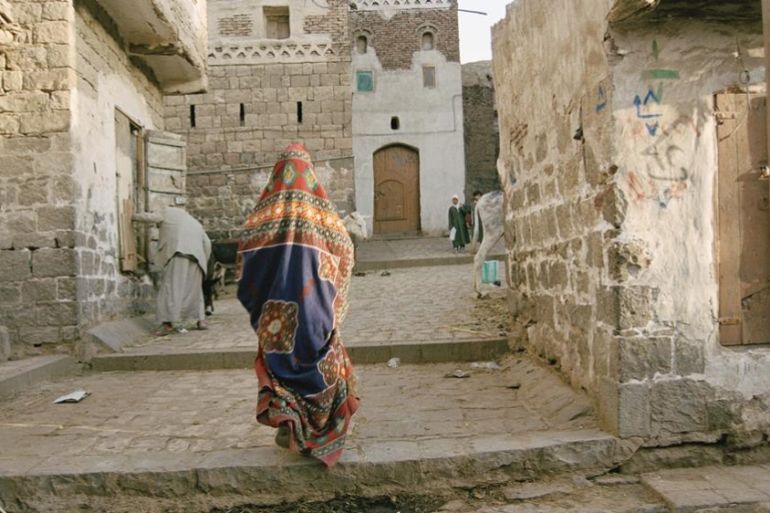Yemen’s widows ‘weakest victims of the war’
Many widows struggle to eke out a living for themselves and their children, with little help from charities.

Taiz, Yemen – Every morning by 5am, Zobiada al-Zikri, a resident of Taiz city, wakes up to go to the market and buy leeks. Then she walks around neighbouring villages and sells the product, which yields around 1,000 Yemeni riyals ($4.65) – enough to support her family.
After her husband died five years ago, Zikri became the sole breadwinner of a family of four children. “When Khalid died, more than one charitable association in Taiz city started to support me in raising my four children, in addition to charitable neighbours who gave me a monthly amount. So I did not suffer during the last five years,” Zikri said.
Keep reading
list of 4 itemsPalestinian Prisoner’s Day: How many are still in Israeli detention?
‘Mama we’re dying’: Only able to hear her kids in Gaza in their final days
Europe pledges to boost aid to Sudan on unwelcome war anniversary
But since the fighting came to Taiz, the neighbours who used to help Zikri left Taiz for their home villages, charitable associations closed their doors and Zikri no longer received any aid.
Zikri hopes that the seven-day ceasefire, that came into effect in Yemen on Tuesday, will put an end to her suffering and that of many widows who have been especially hit by the war.
The nine-month war resulted in nearly 6,000 deaths and a growing number of widows and orphans.
READ MORE: Letter from Sanaa: Some long for death as a way out
The Yemeni government does provide welfare to poor families, but, according to one widow, the amounts are small.
When the war broke out in Yemen, the international financing for the Social Fund for Development had been stopped.So all the projects by the fund stopped, including more than 280 projects supporting the women
“I still get 6,000 Yemeni rials ($27.90) monthly from the government, but this is not enough for one week,” Hussn Moqbel, another widow living in Adeem village in Taiz’s al-Mawaset district, told Al Jazeera.
Moqbel, a servant who works around eight hours a day to support a family of seven, says her life was made harder by the war.
Her husband died three years ago of cancer. His family used to help their daughter-in-law and grandchildren, but when the war broke out in Yemen, they lost their jobs and could not help any more.
Moqbel used to receive donations from individuals and local organisations such as the Muneef Association. The Social Fund of Development, which was established to contribute to development plans for poverty reduction in the country, is also used to support these widows and their families. These projects, however, stopped when the war began.
“The current crisis forced me to work as a servant with displaced people from Taiz who rented a house near me. They pay me 1,200 rials ($5.60) a day. In addition to that they give me some of the food,” Moqbel said.
Ala’a Al-Adeemi, the displaced man for whom Moqbel works, said the community should help women like her.
“If the war stopped and life returned to normal inTaiz and I could open my shops again, I would not forget Moqbel and I will pay her a monthly amount that is enough for her to live,” he declared.
READ MORE: Starvation in Yemen: ‘We are hoping just to survive’
Widows living in Yemen’s capital Sanaa are suffering too. In Sanaa’s Shumaila market, Fatima al-Baqal, a widow in her 40s, sells a type of Yemeni bread called malooga.

“My husband Abdul-Jabbar died 16 years ago, but I did not suffer as much as I do nowadays. I have three girls. One of them has been married and two others are still with me at home helping me to prepare malooga [a Yemeni bread],” Baqal told Al Jazeera.
After the death of her husband, she began to receive donations from charitable associations and individuals, in addition to some financial support from her relatives.
However, when the war started, “all the associations stopped supporting us. Even my relatives lost their jobs and they became jobless men, so they do not help me any more and that is why I preferred to sell malooga in the market, as making malooga is the only skill that I have,” she added.
“I hope that this crisis ends soon, as I cannot bear to sell malooga. The Yemeni government has to help us and provide us with the basic needs to live without misery,” she said.
But the provision of government aid has been hampered by the war. “When the war broke out in Yemen, the international financing for the Social Fund for Development had been stopped.So all the projects by the fund stopped, including more than 280 projects supporting the women,” a source in the Social Fund for Development told Al Jazeera on condition of anonymity, because he fears the Houthi rebel group that currently controls the Fund.
Fadhl al-Dhobhani, a professor of sociology at Taiz University, told Al Jazeera that widows in Yemen are especially vulnerable in times of war and civil strife.
“The widows usually do not have skills and they are not educated, so they resort to work as servants or as sellers of cheap goods to eke out a livelihood,” he said.
“However, the Yemeni government has to help them as they are the weakest victims of the war.”
Meanwhile, Zikri, who returned to her village last August, says she will continue to sell leeks.
“In the beginning I was shy of being a seller, but right now I have customers and they know me. So I am not shy – I actually enjoy the work as I became independent, which is better than waiting for charitable associations or people.”